Phonetic Survey of Kyrgyz Dialects
This page presents an organised "face to the world" for my research on the phonetics of Kyrgyz dialects which I conducted during the 2007-2008 academic year on a Fulbright fellowship. More topics are gradually being covered here as I work with the data and recall specifically pivotal decisions and events (from a looking-back point-of-view) that affected the project or helped me learn something crucial. A lot of this has also turned into a critique of various issues I've encountered during my research.
Human Subjects
After determining how I was going to conduct my project (which required learning a certain amount about the language and its dialects and the people and how they interact with foreigners who know Kyrgyz, not to mention a good deal of playing with various ideas), I applied for human subjects approval. This was finally granted in April. My questionnaires and consent forms, as well as some sample images were approved.
"Fair compensation"
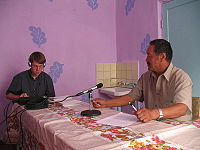
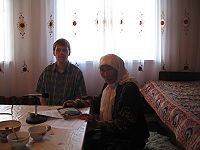
The ethics normally associated with Human Subjects review involves two potentially conflicting ideas—that the researcher should not coërce subjects into participation, and that the researcher should provide the subjects with fair compensation. This presents a potential conflict, especially between what's perceived by the researcher as constituting fair compensation and what's perceived by the subject as appropriate.
A few years ago, a friend of mine was conducting informal non-IRB-approved interviews in Kyrgyzstan to get a feel for a topic she was considering researching more broadly. After each interview, she compensated each subject with an American $5 bill. Many people felt insulted, as if they were being bribed for having helped her, and some others vowed to frame the bill and not use it as currency.
A year later, I found myself back in Kyrgyzstan, preparing to carry out my dialect survey, which I was applying for IRB approval for. Having witnessed my friend's research, and having some exposure to Kyrgyz customs and ways of thinking beyond that, I wasn't sure where to go with with the "fair compensation" part of my IRB application.
I ended up writing along with my IRB application that depending on where each subject was interviewed, I would preform appropriate host duties (if at my home there) or guest duties (if at another's home)—which consisted of providing tea (in the case of being a host) or bringing small consumables, such as candy or vodka (in the case of being a guest)—but that this wouldn't be seen as compensation. For compensation, I ended up offering each subject the opportunity to have a picture taken with me and sent to them, with the condition that I could show anyone I wanted the picture and use it in publications (with the option for the people in the photograph to be kept anonymous or to be listed by name).
Out of 35 subjects, each one was more than happy to have their picture taken, and even happier that I would send them a copy. Only a few subjects—mostly younger, more educated ones—opted not to have their name associated with the picture.
Credit where credit is due
Another common issue encountered when working with human subjects is the problem of providing anonymity versus giving credit. In linguistics, there is a range of how the informants might feel about being given credit by name or remaining anonymous. It was stated really eloquently somewhere, but I can't find this citation: basically, though, it boils down to the fact that some people might want remain anonymous (perhaps out of fear or shame or humility, or just to hold on to some privacy), whereas others want to be credited for data and thanked for aiding in research (out of pride or a sense of fairness, or just to receive recognition for their help). IRB approval strongly promotes the idea of keeping all informants anonymous, but in linguistics (especially language documentation), this idea is easy to argue against.
The strongest argument that can be made in this case is probably for giving the informants the right to decide whether to receive recognition or to remain anonymous. This is exactly what I did. And surprisingly (perhaps not for Kyrgyzstan), much as with the photographs, every last subject said it was okay to use their name in research and materials which resulted from this research.
Preparation
- Decide what topics to examine most closely (Things to look at in Kyrgyz dialects#Linguistic topics)
- Decide what word forms/patterns would fit these topics (Things to look at in Kyrgyz dialects#List of forms to elicit)
- Find words to match these patterns (Things to look at in Kyrgyz dialects#Organising Wordlist)
- Organise words, weed out unneeded, add extra (Things to look at in Kyrgyz dialects#Final Wordlist)
- Take pictures of words found
- Print pictures
Elicitation
I ran around the country interviewing random people. More on this later.
Equipment
- 1 Marantz PMD671 digital audio recorder
- 2 AT3031 microphones
- 1 microphone clip mount
- 1 microphone stand
- A series of 4GB CF cards
- 2 really long microphone cables
- Rechargeable AA batteries and charger
Sample recording
Here's a recording from one of my interviews File:S01p17 keskeldirik.ogg
Questionaire
Data recorded by researcher:
- participant number
- sex
- date
- location
- coordinates
Questions given to subject:
- Year of birth
- Which languages known at what levels
- Better knowledge of Kyrgyz or Russian
- What language(s) spoken when growing up
- What language(s) educated in
- High level of education received
- Place where grew up
- Where lived in lifetime
- Profession / job
- Tribe
- Mother's tribe
- Where parents are from
- Consider self to speak Kyrgyz different from others
Results
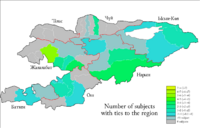
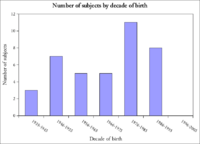
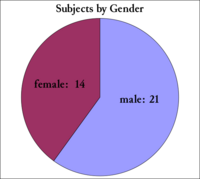
This section shows off my results. At this point, there's just some demographic data of the 35 subjects, as of the end of the fieldwork, including a map of subjects' regional affiliations, a graph of age distribution of subjects based on year of birth, and a graph showing distribution of subjects by gender.
Local research conditions
Interaction with local scholars
Fulbright fellows are supposed to declare a "host institution". Based on a suggestion from Elmira and some research on my own online, I decided to declare Бишкекский Гуманитарный Университет (БГУ - Bishkek Humanities University) as my host institution.
I went there at some point early in my grant—though after having learned some Kyrgyz (early December?)—to meet with scholars and discuss my project with them. I managed to track down the guy Elmira had mentioned having studying under, and set up a meeting with him (later that week / the following week). After explaining what I was looking at to him, and having him explain a few gaps in my knowledge to me, he all but told me he didn't think there was anything left to learn by doing phonetic fieldwork on Kyrgyz dialects and showed me some books I might be interested in (mostly on literature, and the main one on dialects I already had). He told me about the primary work on Kyrgyz dialects, which I'd seen in Osh, and which I'd already vowed to get my hands on a copy of. As I was getting ready to leave, I asked if he had any students who might be interested in working with me—maybe getting a copublication or course credit out of it—and his answer was, "You mean grad students." Of course. He said he had a small class studying dialects (which I was interested in sitting in on, but I got the impression that the idea made him uncomfortable), and maybe someone would be interested. Sure, he'd introduce me—some day. I left and never saw him again.
Later, this one guy (the brother of B, a Kyrgyz girl living in Turkey who I'd met through kyrgyz.us and had been talking with online) introduced me to this one scholar at the Академия Наук (Academy of Sciences). This scholar appeared to know some things about dialects, but maybe not much more than the average educated Kyrgyz—just with some academic framework around it. He decided to introduce me to another scholar, who apparently wrote a book on the phonetics of Kyrgyz dialects. I met with him a couple times, told him about what I was interested in doing, and got told that "we don't do that anymore; it's too hard." And also that he'd written the book on that, and didn't think there was anything more to learn about it. He gave me a disk "with his book on it" (turned out just to be the table of contents, sadly), which I returned to him the next time I saw him—at the grand opening for a new center on language issues at the Academy of Sciences which he was somehow involved with and invited me to, basically to show off this American Kyrgyz speaker to all these Kyrgyz-speaking patriots. Also, it was an interesting day-long conference, and I got involved in some fun discussions with some Kyrgyz teachers (etc.) about the sad state of materials on the Kyrgyz language. And met a French computational linguist who was "teaching language and computers" (a joke to him) at the Academy of Sciences. And who had been making efforts to learn Kyrgyz for much longer than I had been, and had barely hit the basics (most likely due to the poor state of materials). Also, the scholar I'd met with who wrote the book on Kyrgyz phonetics did promise to get me a copy of the book, but I never got it: I ran out of time to meet with him again, and my primary research was much more important. Fortunately, however, I ran into a copy of his book in the IU library the following winter. It's the only thing that really exists that looks at Kyrgyz phonetics or dialects in any way that even approaches what I'm interested in, but even then it falls flat. I will say that it has some nice isogloss maps, but some isoglosses are more informative/interesting than others (and some aren't covered by the book but should be).
Library access
Due to my lack of skills in Kyrgyz at the time, I couldn't bring myself to go to any libraries in Bishkek during my first couple months in the country.
However, over Thanksgiving I went to Osh, where one rainy afternoon, I stopped by the regional library, which was right down the road from Thatcher's place where I was staying. I went in, asked for books on Kyrgyz dialects, got a funny look and asked what I meant, repeated it, and about a minute later got handed a copy of Junusaliyev's definitive work on Kyrgyz dialects. I flipped through it for like an hour, writing down page numbers (and ranges..) in the hopes of getting it copied. I really wanted to just buy the book from the library (which I'd heard was possible), but I couldn't even bring myself to ask the necessary question, mostly because I prefer for useful resources to be available to other people. Instead, the librarian copied the parts of it for me that I requested. She had very little clue how to operate their desk-top copying machine, which was very low on toner and seemed unhappy about the cheap paper it was being fed.
Upon my return to Bishkek, I vowed to go to the National Library and get a complete copy of Junusaliyev's book. I got up the energy to head there after class one day in December, and stopped in at the art museum down the street to make sure I was going in the right direction. Apparently I was only one block short of the library, but I noticed an advertisement for a photo exhibit coming up, and kept it in mind to tell Thatcher about. When I reached the library, I was turned away because I didn't have an original copy of my passport on me. I wasn't even allowed to enter beyond the lobby.
I didn't get another chance to go before new year's. After new year's, through a combination of technical issues, foggy and snowy weather, and other impedances to Thatcher's travel plans, he was stuck in Bishkek for most of a week—right in the middle of that photo exhibit. So he and I went (and Lara was supposed to join us, but never showed up), and enjoyed the museum bookshop (where Thatcher discovered a bat sleeping on the shelves), the photo exhibit, and everything else the museum had to offer. Thatcher seemed to enjoy the very idea of having a photo exhibit in that space more than anything, and we left the museum feeling pleased with ourselves, and maybe a little overwhelmed. Being a block down from the library, and still needing to get my hands on a copy of that book, I asked Thatcher if he would mind if I just stopped by the library to check for research materials. He was fine with that, so we headed down to the library. There we had some adventures with getting day passes and some unfortunate miscommunications between Thatcher and the lady standing [sitting, really] guard by the stair-well for those without day-passes (e.g., Thatcher).
In the meantime, I went upstairs, found the correct room, and asked the librarian there if they had any books on Kyrgyz dialectology. She looked a little nervous, but told me no pretty much right away. I asked her, well how about Junusaliyev's book, Кыргыз Диалектологиясы? She said they didn't have it. I knew this couldn't be right, and explained to her that I was researching these topics and had found this one book in the regional library in Osh, and was hoping to find more resources here. She could see I wasn't local and that I must've come a long ways and had learned a lot already to even be asking her about this in Kyrgyz, but she said she couldn't help me.
I headed out a little discouraged, only to find Thatcher running up the stairs as the Guardian of the Stairwell shouted after him. I told him it was time to go, and we headed back down the stairs and dealt with the guardlady. After what amounted to apologising for "misunderstanding" her waving her arms at Thatcher, I turned in my daypass in exchange for my passport, and we headed out. We'd just made it out the door when a girl ran out of the library and introduced herself to me. I'd noticed her sitting right by the desk where I'd asked about these resources on Kyrgyz dialects, and she, along with everyone else in that room, had been paying very close attention as I talked with the librarian. She explained to me that the librarians at this library didn't like to go digging in the archives to get books out for people—even for her, who frequently managed to convince them to—and that I'd have better luck at the Academy of Sciences. She offered to take me there and help me find what I was after, and mentioned that she knew some other sources I could look for, since she'd taken a class on Kyrgyz dialects. I made sure Thatcher could find his way back to my place, and headed off with her to the Academy of Sciences.
After alternatingly waiting for and not managing to catch trolleybuses and marshrutkas, we ended up just walking. It was cold, and maybe a little snowy, and at a pace I didn't set (much slower), we got there in a little over half an hour, but talked the whole way. It turned out that they were closing right as we got there, so we headed back the direction we'd come. We stopped outside the National University (I didn't know it yet, but she lived near there) and talked for a good long while before parting ways to head home. Shortly after that we met a few times and talked about language and other such things, and she lent me her notes and other materials from her Kyrgyz dialectology class to copy. We ended up going out for Valentine's day (the fact that we met up on Valentine's day was an accident: "You free this week? Cool, is Wednesday good? Sure, Thursday's fine."), and started meeting on a more regular basis around then. By the end of May we were officially a couple, and a year and a half after that (including many months apart and a separate trip to Kyrgyzstan to visit her) she was able to make it to America and we got married.
Learning Kyrgyz in Kyrgyzstan
One of the first things I did when I got to Bishkek (before I even had a place to live) was to register for Kyrgyz lessons at The London School. I studied there from the very beginning of October until the end of March.
Before I went to Kyrgyzstan, I'd studied some Kazakh (and before that, and to a lesser degree, Uzbek and Tatar). I knew the morpho-phonology of Kazakh well and had a decent basic vocabulary, but couldn't speak very fluently. Because of this, and some very basic knowledge of some of the differences between Kazakh and Kyrgyz (mainly in terms of orthography), I apparently did very well on the placement exam (which included an oral element too).
So at that point, they didn't really know what to do with me. I managed to convince them that I didn't know Kyrgyz grammar very well, despite my placement test scores, and so they had Nurzat eje teach me grammar for two hours every day. They also put me with Lazat eje for an hour every day for conversation. This totaled three hours every day (during the week) of one-on-one Kyrgyz lessons.
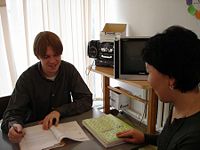
Nurzat led me through the grammar-book "grammar" about Kyrgyz. It was good, because I got a chance to clearly work out the morpho-phonological differences between Kazakh and Kyrgyz, and basically learned everything in this class through its differences with Kazakh. But their concept of grammar is just the morpho-phonology. They figure that once you master that and some vocabulary then you know the language. However, it's not that easy, since (among other things) there are some very rich semantic properties of both the morpho-syntax (e.g., complex evidentiality and aspect systems) and the vocabulary (sometimes fine distinctions in meaning that English or Russian doesn't have, or the lack of fine distinctions that English or Russian has). At the end of December, Nurzat left to work on her dissertation, and they hired Aelita to replace her. She helped me finish up my adventure through the morphology of Kyrgyz, and many of our classes turned into me drilling her on semantic distinctions between various morphemes (especially things like evidentiality, aspect of conditionals, verbs for being upset, etc). Based on the methods I used to learn at that point, my teachers essentially became my language consultants, and the line between classes and fieldwork sessions was blurred immensely.
Lazat's "conversation" class turned out to be more of a reading class, and I had the same problems in that class working out what words meant. One problem was that it's one thing to understand the meaning of a word in a text, and quite another to understand the full range of meanings it can carry. I was also not being asked to produce Kyrgyz (e.g., write in it), which is what really generates ability to wield a language. Lazat gave me a hard time after a month or two, saying that my Kazakh was getting very good, but that my Kyrgyz still needed work. She didn't qualify this at the time, but I realised a large part of it was my accent, which I finally decided to work on. That was the point at which my mind really started keeping the two languages separate, and about the time that my Kyrgyz started improving independently of my Kazakh. Later, I found my Kazakh to have improved to about the level of my Kyrgyz at that point, and only a little further progress in Kazakh came for free with Kyrgyz.
London School gives its students (at least foreign ones) frequent questionnaires (once every week or two) for them to rate the quality of their teachers and to make any complaints they feel are necessary. The first few of these I received, I basically said I was satisfied with the instruction I was receiving. Kenje eje, however, didn't believe me, and encouraged me to mention anything I thought was a problem. After more time there, when I worked out what the issues were (including things mentioned here, but also things like how the high ceilings caused terrible echoing in the classrooms, making it hard to hear my teachers clearly), I started putting it all down. This seemed to make them happy, but after a few questionnaires like this they got overwhelmed. I had been working on some of the pedagogical issues with my teachers, and at first was uncomfortable "going over their heads" (an idea that was irrelevant to them), but decided to let the administration (Kenje eje) know what I was thinking. Before Nurzat eje left, I'd had her more or less [covertly] retrained to be more of a consultant than a teacher; it took a while to [covertly] train Aelita eje in this way too.
In the end, being forced to speak Kyrgyz for three hours every morning was enough to improve my skills a lot. Also, it helped to be exposed to vocabulary and grammar and to have people available who were paid to answer questions for me about the language. However, beyond the bare bones, these teachers didn't know how to teach me to actually learn the language, largely due to their misconception that learning a language consists of memorising vocabulary and morpho-phonology.
The state of research on Kyrgyz outside of Kyrgyzstan
Very little work has been done on Kyrgyz in Western linguistics literature (or otherwise), and even less has been done in English. The few works with any focus on Kyrgyz have suffered from a lack of access to reliable data on the language. This is what inevitably led me to conduct my fieldwork, though it wasn't originally out of a desire to improve the quality of what's out there. The following story details my quest through some of the literature.
The elusive "southern" dialect of Kyrgyz
At LSA 2004, I attended Bob Kennedy's talk "Stipulativity in Kirghiz vowel harmony." This was one of my first exposures to Kyrgyz; at that point, I'd already taken some Uzbek and Tatar, and was just at the initial stages of my plans to go to Kazakhstan for the first time. His talk pertained to the "standard" dialect of Kyrgyz, which, as he showed, had a non-symmetrical rounding harmony system. He did mention in his talk, however, that Kyrgyz had another dialect (the "Southern" dialect) that had a symmetrical system.
The difference between these two systems is that in the "standard" dialect, /ɑ/ will round to [o] only after /o/, and not after /u/ ([tuz-dɑ], *[tuz-do]; [som-do], *[som-dɑ]), whereas in the "Southern" dialect, /ɑ/ will round to [o] after /o/ and /u/ ([tuz-do], *[tuz-dɑ]; [som-do], *[som-dɑ]). Both systems are shown in the following chart.
| root vowel | Kyrgyz | symmetrical "Kyrgyz" | ||
|---|---|---|---|---|
| suffix A | suffix I | suffix A | suffix I | |
| i | e | i | e | i |
| y | œ | y | œ | y |
| e | e | i | e | i |
| œ | œ | y | œ | y |
| a | a | ɯ | a | ɯ |
| o | o | u | o | u |
| ɯ | a | ɯ | a | ɯ |
| u | a | u | o | u |
In spring quarter 2006, for my extrametrical phonology ("Tone and vowel harmony") seminar, I wrote a paper on Kyrgyz rounding harmony. In the seminar, we'd read Kaun's 2004 chapter on the typology of rounding harmony, where Kyrgyz was the sole exemplar of a "type 1" symmetrical rounding harmony system. I wrote my paper around the non-symmetrical version, as described in Kennedy's talk.
That summer, I was in Kazakhstan trying to learn more Kazakh, but went to Kyrgyzstan for a 2-week vacation to travel around the country with my friends Shoshana and Doug while Shoshana did some research. I worked on learning some Kyrgyz while there, and investigated the epistemology of the symmetrical rounding harmony system by asking people about it. When I gave examples [all over the country, even in the south], Kyrgyz-speakers just said "that's not Kyrgyz", and couldn't imagine people anywhere talking like that. People's responses about some of the regional variation did, however, get me interested in the variation that I found to exist among Kyrgyz dialects.
This new interest, along with meeting Fulbrighter Megan Rancier in Almaty immediately after leaving Kyrgyzstan that summer, led me to apply, upon my return from Central Asia at the end of that summer (2006), for a Fulbright to research Kyrgyz dialects. I was subsequently granted the award, and at the end of the following summer (2007), went back. The potential existence of a fully symmetrical rounding harmony system was only one of a handful of things I was interested in investigating, though it was really on the back burner because I doubted I'd find it.
After ten months of researching Kyrgyz and its dialects, I never once ran into anything even remotely suggesting that such a system might exist. I left it as a possibility that maybe this dialect is spoken in Tajikistan or China. However, later review of some first-hand materials in Kyrgyz from these regions (books from China written in the Kyrgyz version of the Persian script, uninfluenced for the most part by the standard language in Kyrgyzstan (as opposed to the dialect leveling that's been taking place in Kyrgyzstan for the last few generations), and audio recordings of music performed by members of the Kyrgyz community in eastern Tajikistan) suggests to me very strongly that these dialects also exhibit the otherwise attested system, or something very much like it. This still doesn't prove that a dialect with a fully symmetrical system doesn't exist, but it does confirm that if such does exist, it's hiding pretty damned well.
In late 2008, I got talking with Bob Kennedy on facebook, and asked about the southern dialect of Kyrgyz that he'd mentioned in his talk in 2004. His response was, "I forget exactly what the details were, but I learned of it from an audience member in that talk. I forget her name but I think she was at Kansas or Kansas State; she either had a local Kyrgyz speaker as an informant or had a colleague who had done field work." (This sounds a lot like he could be referring to Arienne Dwyer, but she has no memory of this.) I poked around the literature more, and found that in Kaun's dissertation, she talks about two distinct varieties of "Kirgiz"—that of Comrie (1981), and that of Hebert and Poppe (1963). The former is her source for the symmetrical variety and the latter for the attested, ubiquitous non-symmetrical variety. (Kaun also shows that Vaux (1993) looks at both varieties as well; I haven't investigated this source yet.)
So I dug up Comrie (1981)—an ambitious book entitled "Languages of the Soviet Union"—and found that he indeed described Kyrgyz as having a symmetrical system. For sources, he says "An older reference in Russian for Kirgiz is Batmanov (1939-40), while Batmanov (1963) is the first volume of a new series: in English, there is Hebert and Poppe (1963)." Having already established that Hebert and Poppe, despite their other shortcomings, accurately describe the non-symmetrical vowel harmony system of Kyrgyz, I looked into the Batmanov sources. At first, I didn't find either of the specific sources Comrie mentioned, but I took a look at every grammar of Kyrgyz written in Russian or Kyrgyz that I could get my hands on, including a 1956 publication on Modern Kyrgyz Grammar and a 1946 publication on the Phonetics of Kyrgyz, both by Batmanov. Not one of these sources so much as mentions a symmetrical rounding harmony system, and each one accurately describes the non-symmetrical one.
At that point, it seemed that Comrie may've gotten his information on the symmetrical system through inference. That is, he may've interpreted a word like quloo (~"to fall down/over, to collapse") as an example of this. However, this is morphologically a gerundive form (formed with -/(U)U/) of the verb stem qula- (a + U → oo); other forms of such words show that rounding harmony does not apply for /a/ after /u/: quladɯm ("I fell down", though usually stated as qulap kettim).
But then in early 2010, after coming to own a copy of Comrie's book, I tried a little harder to track down his source. I requested Batmanov's series through interlibrary loan, only to discover that the IU library had it in the stacks. So I went and checked out the volume on phonology. It turned out to be an interesting find: since the date of publication is 1939—right before most of Central Asia went from the Latin alphabet to the Cyrillic alphabet—the book describes Kyrgyz as written in the Latin alphabet.
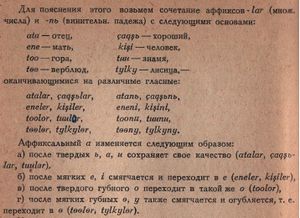

More relevantly, the section on vowel harmony in Batmanov's book correctly describes the asymmetrical vowel harmony system. However, one of the key examples has been changed with green ink. Specifically, for the plural of the word /tuu/ ‘flag, banner’—/tuulɑr/—was rewritten as ‘tuulor’. See associated graphics, scanned from Batmanov.
I understand that Comrie was at IU for a while in the period around when his book came out. It's possible that the version of Batmanov's grammar that I checked out of the library is the version Comrie used. There're some penciled-in notes that look like the sort only a linguist would write in (such as indicating that sonorants should be classified with the voiced sounds instead of with the voiceless sounds), suggesting that maybe Comrie was editing his sources at some level as his used them. However, this mark was in green ink, not pencil, so it's possible that someone changed the example before Comrie got a hold of the book.
In the end, there are three likely scenarios as to how Comrie's book ended up with incorrect data: a misgeneralisation on Comrie's part, a mark in a book by someone else, or a mark in a book by Comrie. However it happened, this one mistake led to an entire literature on the typology of rounding harmony which considers a system like that of the "symmetrical" version of Kyrgyz (that is, a system with full-out front-back and rounding harmony) as attested, whereas it may very well not be. Not only does Kaun's study consider it to be attested, but it considers it to be some sort of typical or unmarked system (Kaun's "Type 1" system, where rounding harmony is "unrestricted"). Her study is very careful to keep track of which systems are attested and not and what her account predicts about what should be attested and not, so perhaps things should be reconsidered, at least proceeding with caution as to the existence of the symmetrical system in Kyrgyz. Another outcome of this small mistake is the direction my life has taken over the last couple years.
Krippes's "Kyrgyz"-English dictionary
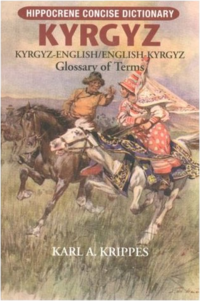
[When this was originally written,] the only Kyrgyz-English/English-Kyrgyz dictionary readily available outside of Kyrgyzstan is by Karl Krippes. It's hard to know where to begin in reviewing this dictionary.
Let's start with the cover. It would appear that an attempt was made to depict the traditional sport qyz quumay. However, even if one is not familiar with the Kyrgyz, one notices that it's very unlikely that both of the riders in this piece of art are Kyrgyz. An examination of their dress suggests that the guy might be Buryat and the girl might be Ukrainian. The steppe-land they're galloping across could theoretically be in Kyrgyzstan, but it seems unlikely given the characters.
Opening the cover, we find that the dictionary is an abridgement of Yudakhin's Kyrgyz-Russian dictionary. Wait, so he translated the dictionary?? Isn't the first rule of dictionary-making to not translate a dictionary at all costs?
Any way I go about a review beyond this, it goes from amusing to really depressing. Here's my best attempt not to depress anyone, and to be nice.
First of all, one might notice that many common words are missing: күл- "to laugh", өт- "to pass", жөн эле "just, simply", куу- "to chase", and the list goes on. Many more are just flat out wrong: жогот- means "to lose" not "to destroy"; жинден- means "to get angry" not "to go crazy"; береке means "generosity", not "success"; баштык means "bag", not "chief; head; commander"; батек doesn't mean "sock", only "insole"; баткак can't mean "filth" or "dirt"—just "mud"; etc. Some words are misspelled (or misrepresented due to the author's lack of understanding of the morphophonology of Kyrgyz): жу- "wash" should be жуу-, соол- "dry up" (transitive or intransitive??) should be соолу-, силк- "to shake" (transitive or intransitive??) should be силки-, жүдө- "exhaustion, fatigue" should be жүдөө. Also, the dictionary has a handful of literary forms (or maybe just Kazakh words) that no one knows, and these aren't indicated as such in the dictionary; for example, чабандоз, given as meaning "rider, horseman" is apparently just the Kazakh word шабандоз; the Kyrgyz word чабандез is an archaic word of the same meaning that very few people know.
Ignoring words that are wrong or missing, the dictionary is hardly usable. First of all, there are two uses of any dictionary. For example, a native English speaker might look up a Kyrgyz word in a Kyrgyz→English dictionary to learn what it can mean. That is, the English-speaker heard or read the word, and wants to know the range of possible meanings so that they have some idea of what it probably means in the context. A native Kyrgyz speaker, on the other hand, looks up a word in a Kyrgyz→English dictionary to learn how to say something in English. Presumably if the Kyrgyz word has a range of meaning which overlaps with the range of meaning of say, three word words in English, then there needs to be some explanation in the dictionary of what each of these words mean. These two uses for a dictionary hold in reverse for an English→Kyrgyz dictionary.
Now, Krippes points out that his dictionary "is intended for beginning students and travelers who are speakers of American English." However, we find cases of each the four potential uses of his dictionary (or even the two just for English speakers—i.e., each side of the dictionary) where the usefulness of the dictionary falls apart. For example, an English speaker might look up the Kyrgyz word дүрбү, and find that it means "binoculars"; in fact, this word refers to any long-distance viewing device, including monoculars and telescopes, but these words aren't listed here. Also, a Kyrgyz speaker might look up this word to find the word for telescope, and would end up saying "binoculars" instead. An English speaker might look up the word бүт-, and find that it means "to finish, end", but will get in trouble (or at least confused) if they don't realise that it's the intransitive form of the verb and not the transitive (i.e., "I finished my work" would use бүтүр-; "My work ended" would use бүт-). A Kyrgyz speaker might have a similar problem; and then a Kyrgyz speaker might look up кооз and find that it means "nice, beautiful, elegant", and then say "Kyrgyzstan is a very elegant country." Similarly, an English speaker might look up "light" and have to choose blindly between the words "жарык; жеңил; жак-, күйгүз" (bright / sunlight; lightweight; to light (a candle) / to start burning, to light (a fire) / to start burning / to turn on). Or "burn" for that matter, which is given as "күй-, күйгүз-", the former intransitive, the latter transitive (the former is missing in the Kyrgyz-English side). Or өс-, meaning "to grow, increase", which in this case is intransitive (өстүр-, the transitive form, is not in the dictionary). Or "ring", with forms "шакек" (ring as jewelry) "тегерек" (which actually means round or circular), "коңгуроло-" (which isn't a word; however, коңгура- means "to ring" as a bell might) and "шыңгыра-" (another word for a bell ringing)—with no explanation for what's what.
I could go on, but I think this is far more than enough to show my disappointment with this bloated word list. Each problem I mentioned is a recurring theme, and there're other sorts of problems that I didn't begin to mention here (part-of-speech being mislabeled, the "transcription" system used for English words (he obviously had it in mind for Kyrgyz speakers to use this dictionary—or was trying to mock their pronunciation, with words like "thirst [тирст]"), formatting errors, ...). Not only is it mostly unusable for anyone who might be trying to use it for something other than a paperweight, but it lands far from being useful to even its intended audience of English-speaking travelers. Or maybe at some level it serves a purpose for them: to make English-speaking travelers feel more trendy and learnèd as they travel in Kyrgyzstan—they can pretend that they're able to casually pick up Kyrgyz as they go, with the help of this book. I've met few foreigners who, even with classes, have learned to say more than "what's your name?" and "where's the bazaar?" in Kyrgyz. This dictionary is certainly not going to help improve this situation.
World Atlas of Language Structures
There's an impressive volume that's been put together with input from a number of linguists, called the World Atlas of Language Structures (there's an expensive hard-copy published version, but it's also accessible online). It's self-described as "a large database of structural (phonological, grammatical, lexical) properties of languages gathered from descriptive materials (such as reference grammars) by a team of more than 40 authors (many of them the leading authorities on the subject)."
"Kirghiz" is one of the languages included in the work. Looking at the data for Kyrgyz included in the atlas, several data points are confusing to me. For example, the section on uvular consonants claims that Kyrgyz only has uvular stops, and no uvular continuants. This is incorrect—Kyrgyz has both uvular stops and continuants, and while [g]/[ɣ]/[ɢ]/[ʁ] may indeed be only one underlying phoneme, /χ/ and /q/ do contrast, with minimal pairs like /χɑn/ "khan" and /qɑn/ "blood". Also, the section on different words for hand and arm claims that Kyrgyz has distinct words for the two. This is incorrect as well—Kyrgyz has one word, /qol/.
Another thing that sticks out about the atlas is its treatment of Fu-yü Gırğıs as a variety of Kyrgyz, even attributing to it the ISO code for Kyrgyz.
The UNESCO Altas of the World's Languages in Danger has similar problems.
I have submitted corrections, citing sources that confirmed what I was saying. The only responses I have ever gotten have been after nearly two years and have been much like this one:
Dear Jonathan Washington, The information submitted by you on the 05/02/2009 concerning Alabugat Tatar has been carefully considered by the editorial team of the Atlas. However, it is with regret that we have to inform you that it will not be possible for us to agree with the implementation of the suggested change. We would like to take this opportunity to thank you for your interest in contributing to the improvement of the Atlas of the World's Languages in Danger. We strive to find the best solution to each case, and we are sorry that at this time an agreement could not be reached. Kind regards, Editorial team, UNESCO Atlas of the World's Languages in Danger
Kyrgyz as an endangered language
Kyrgyz is spoken by roughly 4 million people, and most people agree that it is no immediate threat of no longer being spoken (I think UNESCO's report probably agrees with this, based on their criteria, but I need to check). However, in some respects it can be thought of as an endangered language.
Something that linguists try to "save" by documenting an endangered language is its ways of classifying the world. That is, linguists are interested in the speakers' folk-taxonomies of things like flora and fauna, and also things like verbs of motion, or the linguistic conceptualisation of time. These add to the knowledge of the diversity of what the possible range for things like this is, and inevitably can help linguists to better understand Language.
As with any language which is the product of a complex history of contact and interaction with other languages, Kyrgyz often has as many as four or five words for the same (or similar) thing(s). Sometimes these words have nearly identical meaning, and sometimes they represent a range of similar meanings. In this way, the situation is much like English. However, with the modern dominance of Russian in the lives of Kyrgyz speakers, many people simply turn to the sometimes "easier" Russian ways of expressing things, or calque Russian structures. By doing this en masse, some of the finer distinctions in Kyrgyz are lost (see the Dogon movies site for examples of the sort of thing I have in mind).
In this sense, some of the linguistic "richness" in Kyrgyz is being lost. This goes hand-in-hand with the loss of related cultural knowledge. This is not to say that there's anything wrong with language change, but just to highlight that documenting any language at any time can be an act of linguistic preservation.
Bilingualism, Domains
The first stage UNESCO uses to classify a language at risk is "unsafe", meaning "most children speak language but restricted to certain domains" (see UNESCO's Atlas of the World's Languages in Danger and an article on economist.com about disappearing languages). This is very true of both Kazakh and Kyrgyz in urban areas. However, I'd say it's true for maybe only half of all Kyrgyz speakers in Kyrgyzstan. I really wish there were good numbers on this...
And as mentioned previously, even if the languages are still spoken natively, many of [especially] the more interesting points can be lost when a language isn't spoken across all domains of life.
"Medium density"
Another part of this rant relates to how linguists think of endangered languages. I should elaborate on this more, but for now see my blurb on what are sometimes referred to as medium density languages (which Kyrgyz counts as).